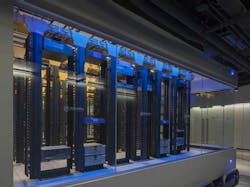Suddenly, carrier hotels and meet-me rooms are sexy again.
Nearly 20 years after they marked the frontier of the transition from telcos to data centers, these facilities are once again attracting investment and business. As cloud campuses proliferate in the suburbs and beyond, carrier hotels are reinforcing the value of wired real estate in major cities.
Leading the charge is Netrality Properties, which is building a chain of carrier hotels and upgrading their meet me rooms to boost the flow of data between carriers, network operators and content specialists. Netrality, a joint venture between developer Amerimar Enterprises and telecom veteran Hunter Newby, has acquired buildings in New York, Philadelphia, Chicago, Houston and Kansas City. The company, named for its focus of networks and neutrality, is creating advanced meet-me rooms in each property.
Netrality isn’t alone in its investment focus. Infomart Data Centers is upgrading its flagship carrier hotel at 1950 Stemmons in Dallas, adding a meet-me room and building out 3 megawatts of turn-key data center space. The company is planning additional investment that could add a new building on the Infomart property, revitalizing one of the prototype carrier hotels of the 1990s.
Meanwhile, data center heavyweight Digital Realty has completed its $1.9 billion acquisition of Telx, placing urban meet-me rooms at the heart of its “connected campus” strategy to accelerate its business in cloud computing and Big Data.
Where The Meet-Me Room Was Born
The term “carrier hotel” dates to the Telecommunications Act of 1996, which cleared the way for competition in the telephone and Internet business. The act cleared the way for competitors to access the network by colocating infrastructure within the Bell companies’ facilities. Shortages of access and trust prompted the newcomers to a new strategy: leasing space in buildings adjacent to the incumbents’ central offices in major cities. Dozens of carriers and network operators soon bought up space inside buildings like 60 Hudson Street in Manhattan and One Wilshire in Los Angeles, coining the term “carrier hotel.”[clickToTweet tweet=”Carrier hotels are reinforcing the value of wired real estate in major cities.” quote=”Carrier hotels are reinforcing the value of wired real estate in major cities.”]
Carrier hotels became the early cornerstones of the Internet economy, and some of the most successful properties in the colocation industry. A key piece of the business model is the meet-me room, a common area where providers can make connections between their networks. Interconnection facilities can be operated by building owners, non-profits or commercial service providers.
Netrality: The Power of Free
Netrality’s formula is a real estate strategy built atop the enduring power of the cross connect – the physical connection between networks that knits the Internet together. Netrality has just completed a new meet-me room at 401 North Broad, the marquee carrier hotel in Philadelphia.
A look inside the Netrality meet-me room inside 401 North Broad, the leading carrier hotel in Philadelphia. (Photo: Netrality)
“Netrality is in the traditional real estate business,” said Newby. “We’re not competing with our customers or charging for cross connects.”
He believes that cross connects yearn to be free. “Customers want that model,” said Newby, who used this approach to help Telx build a prosperous business at 60 Hudson Street. “It’s just economics. They want to be as close as possible to their partners. There’s a demand for the culture and philosophy and environment that we created at Telx.”
Newby began working with Amerimar and its CEO, Gerald Marshall, to buy connected buildings and develop meet-me rooms to enhance their tenant lineup. In 2012 the companies bought 325 Hudson Street in Manhattan, and followed that up with deals to acquire 1102 Grand in Kansas City, 1301 Fanning in Houston, 717 South Wells Street in Chicago and 401 North Broad in Philly.
“These are original carrier hotel addresses that everyone in our business knows,” said Newby. “What’s fascinating is that at a time when the market is deemed to be mature, there’s still these buildings out there without a meet-me room.”
Newby says Netrality’s acquisition strategy has been to either buy the best building in a market, or buy the second-best building and install a better model. “We picked the right buildings in the right cities,” said Newby.
Infomart: Early Mover Among Carrier Hotels
If you’re looking for connectivity in Dallas, the Infomart has always been the right building. Built in 1986 by legendary Dallas developer Trammell Crow, the building’s distinctive glass facade was designed as a replica of the Crystal Palace built in London in 1850 as part of the first World’s Fair. A huge center atrium features a fountain designed by Italian crystal specialists Barovier-Toso, which replicates the firm’s design for the indoor fountain at the Crystal Palace.
The huge center atrium at the Infomart features a fountain designed by Italian crystal specialists Barovier-Toso, which replicates the firm’s design for the indoor fountain at the Crystal Palace. (Photo: Rich Miller)
Crow’s plan was that Infomart would become a hub for IT industry commerce and trade shows. The 1.6 million square foot property struggled for years to fulfill that vision, but found a niche in the early 1990s when it began leasing space to telecom tenants. The Infomart quickly developed into one of the major carrier hotels in Dallas, along with 2323 Bryan (the Univision Center). The building is now home to more than 70 networks and 100 megawatts of power capacity, housing major operations for Equinix, Cologix, ViaWest and NTT America.
Last year owner ASB Real Estate Fund merged the Infomart with another portfolio company, wholesale data center specialist Fortune Data Centers. The combined Infomart now boasts a national network, with facilities in northern Virginia, Silicon Valley, Oregon and Dallas.
“Our thesis is to be in highly-connected core markets,” said John Sheputis, the CEO of Infomart. “The business of being connected becomes more valuable over time. The Infomart is valuable because it’s the best building in that market. It’s the most connected, and in my opinion, it was under-marketed.
“We’ve got grand plans,” Sheputis added.
Infomart is investing tens of millions of dollars in upgrades to the property, starting with a landlord-operated meet-me room and the introduction of wholesale turn-key data center suites. The company is completing the 3 megawatt first phase of the wholesale space.
Sheputis wants to offer larger data center footprints in downtown Dallas. Previously, large data center requirements have sought wholesale space in the northern suburbs of Dallas, where Digital Realty, CyrusOne and others operate wholesale campuses. Sheputis thinks the connectivity at the Infomart will help capture some of that business.
“We are adding a new class of inventory inside the most connected building in one of the fastest-growing markets,” he said. “I don’t mind competition. Competition is a sign of a vibrant market.”
Infomart hopes to add up to 30 megawatts of additional capacity by adding a second building on the campus, which is surrounded by large parking lots. Sheputis says Infomart has the ability to build a new parking deck and then use the existing real estate to add more generators and a second building.
It’s Not About Shinier Widgets
As America embraces digital business, Newby believes that connectivity is the ultimate long-term play. In addition to the Netrality carrier hotel business, he is building dark fiber networks into new markets with Allied Fiber.
Newby sees Digital Realty’s acquisition of his former firm as a validation of the model. “My vision was that we would acquire all the carrier hotels in the US and put Telx in as the meet-me room provider,” he said. “With Digital Realty buying Telx, that’s finally happened.”
Success doesn’t hinge on new models or reinventing the wheel, he says, but rather on the execution of known strategies that require some time and investment.
“We already know what the network providers prefer,” said Newby. “Our generators aren’t shinier than the next guy’s. It’s the model and the culture under which we operate. Best practices is really what it’s about right now. We’re just repeating a lot of things that have worked, and looking at new properties to develop.”
Newby says there are more opportunities on the horizon. “There are markets that are untouched, and pristine in their disorganization,” said Newby.
About the Author



